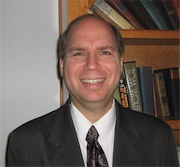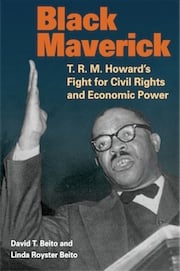T.R.M. Howard was not everyone’s idea of a civil rights hero, and his accomplishments have been widely neglected. But as historians David Beito and Linda Royster Beito demonstrate in their book Black Maverick: T.R.M. Howard’s Fight for Civil Rights and Economic Power, he was in fact one of the most effective black civil rights leaders of his generation and a key figure in bringing civil rights to Mississippi and empowering black voters in Chicago. I put six questions to David Beito about his new book.
1. Howard’s life puts him at the center of a number of historic events, usually playing a vital role, particularly in the civil rights movement of the fifties and sixties, yet his name rarely figures in the short list of leadership figures cited in the media. Has his role been underappreciated?

Yes, very much so. Standard works in black history rarely mention him. Much of this neglect has to do with the political biases of historians. Quite simply, Howard doesn’t fit their ideal of a civil rights leader. He was not an ascetic Gandhi-like figure, a union activist, or a clergyman, but rather a prosperous businessman who did not hesitate to display his wealth, bet on horses, stage ostentatious New Year’s Eve parties, lead big game hunts to Africa, and speed down the highway in his brand-new Cadillac. In contrast to Martin Luther King Jr., he carried guns and was ready to use them in self-defense “just in case.”
Another reason Howard has been forgotten relates to Howard himself. He never tried to pigeonhole himself as a “civil rights leader.” During the 1960s and 1970s, he increasingly focused on his medical practice and hobbies such as big-game hunting. In 1972, his life’s work culminated in the opening of the Friendship Medical Center on the South Side. It was the largest black privately owned medical facility in Chicago. While Howard supported numerous civil rights causes later in life, he preferred to do it from behind the scenes. Sometimes his ego also got in the way of working with other people.
Despite this, Howard was not a man to boast about his past civil rights accomplishments. He always had his eyes on a future project. In this respect, he was one of the premiere renaissance men in black history.
2. You call Howard a “maverick,” and his politics do seem all over the place. He launches his political career working on the California gubernatorial campaign of Upton Sinclair, a self-described socialist, then he turns to a posture of constructive engagement as a Democrat, after which he becomes an Eisenhower Republican, and runs as a Republican nominee for Congress in 1958, getting trounced in a bad year for Republicans. Did he have a consistent political philosophy, or was he more of a political opportunist?
One reason why Howard qualifies as a maverick was that he never thought in terms of rigid ideologies. Unlike some black leaders of the period, he was generally suspicious of utopian or leftist schemes and put his trust in self-help, the work ethic, and entrepreneurship. In this respect, his support of the socialist Sinclair was an exception. Even then, his stated justification had less do with Sinclair’s socialism and more to do with, in Howard’s words, Sinclair’s promise to give blacks a “fair shake.” Personal opportunism was probably a factor. Sinclair noticed and appreciated Howard’s talents and wanted to entrust him with an important role in a potentially winning campaign.
3. Howard really came into the national spotlight with the murder of Emmett Till. Can you describe his role and also explain how he made an enemy out of J. Edgar Hoover?
Howard did much to keep the case in the national headlines through speeches and statements to the press. When Emmett Till’s mother came to Mississippi for the trial, she stayed in Howard’s home. He also provided her with an armed escort to the courthouse in Sumner and saw her safely out of the state after the verdict.
In addition, Howard gave over his home over to black journalists and key black witnesses, such as Willie Reed, a teenager who gave crucial testimony. When an all-white jury acquitted the two white defendants (as Howard had predicted), he repeatedly pushed the theory that more than two people took part in the crime.
After the trial, Howard’s friend Roy Wilkins, the head of the NAACP, arranged for Howard to go on a national speaking tour about the case. In several of these speeches, Howard declared that he thought it “strange” that the FBI seemed unable to solve a crime when a black person was the victim.
This was heresy during a time when Hoover was at the height of his influence. Howard’s allegations so enraged Hoover that he wrote a letter to Howard (which he released to the press) condemning Howard’s charges as baseless. The leading black newspapers all took Howard’s side in this dispute, while Southern white papers condemned him. Typically, the Jackson Daily News considered it “high time that somebody was putting Howard in his place.”
In his campaign to discredit Howard, Hoover found some unlikely allies, including Thurgood Marshall, then chief counsel of the NAACP. An FBI informant reported that Marshall had “no use for Howard and nothing would please him more than to see Howard completely crushed.” Marshall may have been upset because Howard’s Regional Council of Negro Leadership (RCNL) had overtaken the NAACP as the largest civil rights organization in Mississippi. Also, as already mentioned, Howard’s ego rubbed some people the wrong way.
4. In 1956, just as the civil rights movement was getting underway in earnest in Mississippi, Howard pulled up his stakes and moved out, ultimately settling in Chicago. What made him decide to leave?
The most important reason for Howard’s exit, in my view, was that the pressure from the White Citizens Councils was pushing his wife Helen to the psychological breaking point. He feared for her continued survival for more reasons than one. She had a stroke soon after they left, which her brother blamed on her experiences in Mississippi.
Second, as I said, Howard was always moving on to new projects, and Chicago appeared to offer exciting prospects for a successful medical and political career. Almost immediately after he arrived, he launched a campaign to run against Chicago’s black congressman, William Dawson. Some criticized him for leaving Mississippi, but it should be remembered that many activists in Montgomery were equally upset at Martin Luther King Jr. when he moved to Atlanta in 1960 for better opportunities.
5. Howard seems to have enjoyed playing mentor to many notable figures, but it appears from your book that the most prominent of the political figures he helped raise up—Jesse Jackson—did not want to submit to an interview. Any ideas why?

I’m not sure why Jackson was so unwilling to talk with us. One person we interviewed said that Howard once helped extricate Jackson from an embarrassing situation that Jackson would rather not revisit. Readers can draw their own conclusions. Fortunately, Jackson’s half-brother, Noah Robinson Jr. (now in prison), partially made up for this by giving us much valuable information. As Robinson and others commented, Howard was equally at home among the black elite and the masses and repeatedly showed generosity to individuals in difficult straits.
As you note, Jackson was only one of the prominent civil rights figures who Howard mentored. Without Howard, we probably would have never heard of Medgar Evers, who Howard hired out of college, or Fannie Lou Hamer, who had her first exposure to civil rights through the annual rallies of the RCNL. As we argue in the book, without Howard, we might have never heard of Rosa Parks.
6. Gwen Ifill, in her new book, The Breakthrough, presents the idea that there has been a generational shift among black political leaders—from prior generations like those of Martin Luther King and Howard, and also Jesse Jackson, who saw themselves essentially as community leaders and advocates, particularly as civil rights advocates, to the current generation of Barack Obama, Deval Patrick, and Artur Davis, who no longer define themselves or their campaigns in terms of the black community and who consciously pursue a mainstream political agenda. Do you agree with Ifill’s analysis? And what role do you think Howard played in setting the stage for the contemporary generation of “post-racial” black leaders?
I would amend that, by noting that Howard came from the generation that preceded King, who was more than twenty years his junior. This generation depended heavily on local leaders who relied on a self-help and mutual aid strategy for black uplift, as exemplified by Booker T. Washington, who Howard once praised as a “towering intellectual genius.”
Howard anticipated the current post-racial approach in several ways. Like Obama, he excelled as a diplomat to the white majority. He could even charm such notorious racists as Senator Theodore Bilbo. Also, like Obama, Howard also did not like to play the race card and from his youth around powerful whites in Murray, Kentucky, was comfortable in dealing with people on a personal level. One friend said that he never heard Howard utter a racial slur against whites.
While this is true, it was almost impossible for a black person in Howard’s generation to pursue a “mainstream political agenda.” Whether he liked it or not, whites always viewed any of his actions in terms of race.
Unlike King, Hamer, Jackson and Obama, however, Howard had his first success as an entrepreneur and surgeon and used that success as a launching pad into civil rights. Only later did he branch out into civil rights.


